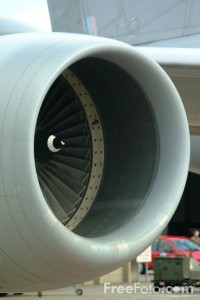The boys from Virgin Atlantic’s Flying Without Fear course are running an excellent series of blog posts on the Top 10 Fears for Fear of Flying, and they added a very readable post on one of those fears… engine failure. Well worth a look (as are the other posts in that series).
Here’s the comment I added to their post, fancied up with a couple of pics…
Why are jet engines so amazingly reliable? Huge design effort, absolutely crazy metals that are supremely strong and temperature resistant, plus the fact that it is a “rotary” engine rather than a “donk”,
What do I mean by that? A car engine, for example, has a large number of bits and pieces, moving up and down, round and round, plus an ignition cycle that is based on an (almost) explosion of fuel and air. This “otto cycle” engine design places huge strains on the parts of your car’s engine.
A jet engine, on the other hand, is smooth in it’s action. The only moving parts are continually rotating, so there’s none of that noisy banging up and down you find in a piston engine.
Also the ignition of the fuel is a continuous process… The fire inside the engine burns continuously… Air flows in the front, and fuel is added to the hot section resulting in continuous power… And none of the stresses a “donking” piston engine suffers.
The metals a jet engine are made of are also far stronger than those in your car… The fan blades on the front, for example, are “grown” such that the very crystalline stucture of the metal contributes to ridiculous strength.
British boffin Frank Whittle invented the jet engine back in the days of WW2 but his design was limited by the metallurgy. That is no longer the case, and engine design, performance and reliability have consequently improved out of sight.
That is not to say they never fail… They do, on occasion. That’s why your airliner has more than one, and why THE biggest part of an airline pilot’s training is in how to handle the full range of possible engine failure scenarios.
The worst thing you have to worry about from an engine failure in a modern airliner is the inconvenience… Your pilots will, most likely, choose to land at a nearby airport as a precaution, and you’ll be delayed while your plane is fixed or alternative arrangements are made.
But if all you have to complain about is “inconvenience”…. life is pretty simple, ain’t it?
If you’d like to learn more about the invention of the jet engine, including some very entertaining video showing early jet engine experiments and an explanation of the inner workings of the engine, check out this video…
[youtube]http://www.youtube.com/watch?v=ervODlXqwAQ[/youtube]
(you can see Part 2 of this video, to see what happens next, at the Junior Flyer website)
Tags: engine, engine failure, frank whittle, jet engine, whittle


At last you are here. Be bold. Sieze the moment. Be the first to take the opportunity to post a comment here.
We have beeen waiting for you to arrive here to provide your feedback. Now that you are here, go ahead and post a quick note. We would appreciate it.